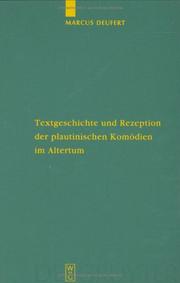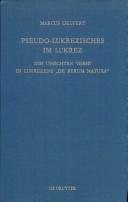| Listing 1 - 10 of 14 | << page >> |
Sort by
|

ISBN: 3110173360 3110907992 Year: 2002 Volume: 62 Publisher: Berlin New York Walter de Gruyter
Abstract | Keywords | Export | Availability | Bookmark
 Loading...
Loading...Choose an application
- Reference Manager
- EndNote
- RefWorks (Direct export to RefWorks)
After his death, the comedies of the Roman dramatist Plautus continued to be staged, and were interpreted by scholars and read by enthusiasts and students. The present study deals with the textual history and reception of these comedies from their first performances (approx. 220 - 185 BC) until the start of their direct transmission (approx. 400 AD). The author traces the changes that occurred in the course of the comedies' performance, commentary and exploitation by scholars and teachers. In the process, he not only draws a fascinating and comprehensive picture of the history of Plautus reception and scholarship in classical times, but also provides important insights into the history of literary and linguistic studies in Rome. Die Komödien des römischen Dichters Plautus wurden nach dessen Tod erneut auf die Bühne gebracht, von Philologen erklärt und von Liebhabern und Schülern gelesen. Die vorliegende Arbeit widmet sich der Textgeschichte und Rezeption dieser Komödien von den Uraufführungen (ca. 220 - 185 v. Chr.) bis zum Einsetzen der direkten Überlieferung (ca. 400 n. Chr.). Der Autor geht den Veränderungen der Komödientexte im Zuge ihrer Aufführung, Kommentierung und Verwertung durch Philologen und Lehrer nach. Er entwirft damit nicht nur ein faszinierendes Gesamtbild der Geschichte der Plautusphilologie und -rezeption im Altertum, sondern gibt auch wichtige Einblicke in die Geschichte der Philologie in Rom.
Blijspel --- Comedie --- Comedy --- Comédie --- Komedie --- Criticism --- -Transmission of texts --- -Literary transmission --- Manuscript transmission --- Textual transmission --- Criticism, Textual --- Editions --- Manuscripts --- Appraisal of books --- Books --- Evaluation of literature --- Literary criticism --- Literature --- Rhetoric --- Aesthetics --- Style, Literary --- Comic literature --- Literature, Comic --- Drama --- Wit and humor --- Appraisal --- Technique --- Evaluation --- Plautus, Titus Maccius --- -Plautus, Titus Maccius --- -Plauto, Tito Maccio --- Plavt, Tit Makt︠s︡iĭ --- Plautus, M. Accius --- Plautus --- Plaute --- Plautus, M. Attius --- Plautus, Marcus Actius --- Plautus, Marcus Accius --- Plautus, Marcus Attius --- Plauto, Marco Accio --- Plautos, Titos Makkios --- פלאוטוס --- Appreciation --- -Criticism, Textual --- Criticism and interpretation --- -Appreciation --- -Comic literature --- Literary transmission --- -Plaute --- Plauto, Tito Maccio --- Transmission of texts --- History --- Criticism, Textual. --- To 1500 --- Rome --- Criticism [Textual ] --- Comedy.
Book
ISBN: 9783110414714 3110414716 3110478587 3110479036 Year: 2018 Volume: 56 Publisher: Berlin, [Germany] ; Boston, [Massachusetts] : De Gruyter,
Abstract | Keywords | Export | Availability | Bookmark
 Loading...
Loading...Choose an application
- Reference Manager
- EndNote
- RefWorks (Direct export to RefWorks)
The critical commentary justifies the text of the new edition of Lucretius' De rerum natura in the Bibliotheca Teubneriana. It discusses many passages which are difficult or corrupt, examines competing conjectures and offers new solutions. Beyond textual criticism the commentary illuminates philosophical, literary and stylistic aspects of the poem.
Lucretius Carus, Titus. --- Lucretius Carus, Titus. - De rerum natura - Commentaries --- Criticism of Lucretius. --- Lukrezkritik. --- Lukrezphilologie. --- Textkritik. --- textual criticism. --- LITERARY CRITICISM / Ancient & Classical. --- Textual criticism --- Editing --- Lucretius Carus, Titus. - De rerum natura

ISBN: 3110150468 Year: 1996 Publisher: Berlin : de Gruyter,
Abstract | Keywords | Export | Availability | Bookmark
 Loading...
Loading...Choose an application
- Reference Manager
- EndNote
- RefWorks (Direct export to RefWorks)
Book
ISBN: 3110550342 3110552051 3110549980 9783110552058 9783110550344 9783110549980 9783110552065 311055206X Year: 2017 Publisher: Berlin Boston
Abstract | Keywords | Export | Availability | Bookmark
 Loading...
Loading...Choose an application
- Reference Manager
- EndNote
- RefWorks (Direct export to RefWorks)
Der Band mit Prolegomena zur neuen Editio Teubneriana des Lukrez behandelt Grundsatzfragen der Textgestaltung. Die beiden Hauptkapitel über die karolingische und die humanistische Lukrezüberlieferung führen die handschriftliche Grundlage vor Augen, auf der die Edition basiert, und begründen die Anlage des textkritischen Apparats. Bei seiner Konstitution wurde die gesamte handschriftliche Tradition in Betracht gezogen, aber nur ein Bruchteil des überlieferten Variantenmaterials aufgenommen. Die karolingische Überlieferung wird auf die nicht als Sonderfehler der erhaltenen Handschriften eliminierbaren Varianten reduziert. Aus der humanistischen Überlieferung werden lediglich Konjekturen herausgezogen und ihren Quellen zugewiesen. Zwei weitere Kapitel sind der Gestaltung der Paratexte der Lukrezüberlieferung und der Orthographie des Lukreztextes in der neuen Ausgabe gewidmet. Die Paratexte werden in einer vom eigentlichen Gedichttext abgesonderten Edition dargeboten und konservativ behandelt; bei der Gestaltung der Orthographie des Lukreztextes wird das handschriftlich dokumentierte Nebeneinander älterer und neuerer Schreibungen als typisch für die Epoche des Lukrez erwiesen und beibehalten. Der Band wendet sich mit den in ihm verhandelten grundsätzlichen Fragen über die Lukrezphilologen hinaus an alle Wissenschaftler, die sich mit der Problematik der Konstitution antiker Texte befassen. In two large chapters, the volume introduces the Carolingian and humanistic tradition of Lucretius’s text, basing its analysis in the new Teubner edition of Lucretius. Two additional chapters discuss how the new edition deals with the Lucretian paratexts and the orthography of the Lucretius text.
E-books --- De rerum natura. --- Lucretius / tradition. --- Lukrez / Überlieferung. --- Paratext. --- Titus Carus Lucretius. --- Titus Lucretius Carus. --- paratext. --- Lucretius Carus, Titus. --- LITERARY CRITICISM / Ancient & Classical.
Book
Year: 2003 Publisher: Göttingen: Vandenhoeck und Ruprecht,
Abstract | Keywords | Export | Availability | Bookmark
 Loading...
Loading...Choose an application
- Reference Manager
- EndNote
- RefWorks (Direct export to RefWorks)
Book
Year: 2018 Publisher: Berlin ; Boston : De Gruyter,
Abstract | Keywords | Export | Availability | Bookmark
 Loading...
Loading...Choose an application
- Reference Manager
- EndNote
- RefWorks (Direct export to RefWorks)
Book
Year: 2003 Publisher: Göttingen Vandenhoeck und Ruprecht
Abstract | Keywords | Export | Availability | Bookmark
 Loading...
Loading...Choose an application
- Reference Manager
- EndNote
- RefWorks (Direct export to RefWorks)
Book
Year: 2003 Publisher: Göttingen : Vandenhoeck & Ruprecht,
Abstract | Keywords | Export | Availability | Bookmark
 Loading...
Loading...Choose an application
- Reference Manager
- EndNote
- RefWorks (Direct export to RefWorks)
Book
ISBN: 9783110262513 9783110207811 9783110959512 3110262517 Year: 2018 Publisher: Berlin ; Boston, MA : De Gruyter,
Abstract | Keywords | Export | Availability | Bookmark
 Loading...
Loading...Choose an application
- Reference Manager
- EndNote
- RefWorks (Direct export to RefWorks)
"The edition offers a new critical text of De rerum natura. It has been established after fresh collation of the manuscripts and a critical evaluation of previous editorial scholarship. It is equipped with a critical apparatus, an apparatus of sources and an apparatus of repeated lines. The preface discusses the manuscript tradition of Lucretius and the way the text and apparatuses have been constructed."--
Didactic poetry, Latin --- Latin didactic poetry --- Latin poetry --- Philosophy, Ancient --- Lucretius Carus, Titus.
Book
ISBN: 352580220X 3647802204 3666802206 Year: 2015 Publisher: Vandenhoeck & Ruprecht
Abstract | Keywords | Export | Availability | Bookmark
 Loading...
Loading...Choose an application
- Reference Manager
- EndNote
- RefWorks (Direct export to RefWorks)
| Listing 1 - 10 of 14 | << page >> |
Sort by
|

 Search
Search Feedback
Feedback About UniCat
About UniCat  Help
Help News
News